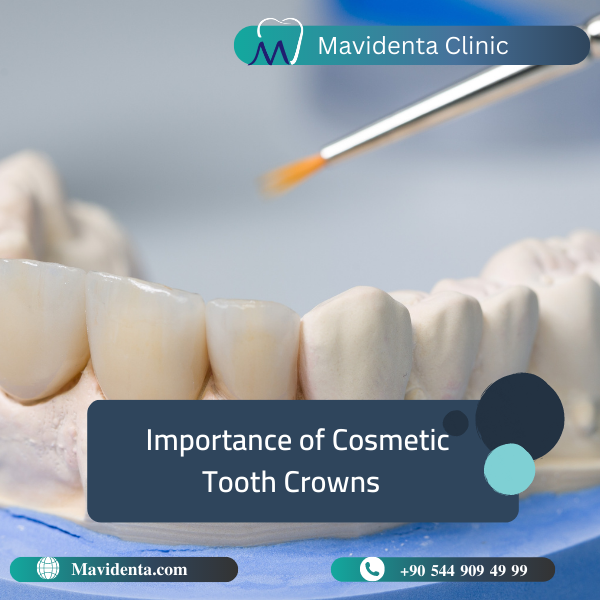Are you self-conscious about your smile due to damaged or discolored teeth? If so, a cosmetic tooth crown may be the solution you’ve been looking for. This popular dental procedure can restore the appearance and function of your teeth, leaving you with a brighter, more confident smile. Let’s explore more about this procedure.
What is a Cosmetic Tooth Crown?
A cosmetic tooth crown, also known as a dental crown, is a custom-made cap that is placed over a damaged or discolored tooth to improve its appearance and function. The crown is designed to match the shape, size, and color of your natural teeth and is typically made of materials such as porcelain, ceramic, or metal alloys.
The crown covers the entire visible portion of the tooth, providing a durable and long-lasting solution for a variety of dental issues, including tooth decay, chips, cracks, and discoloration.
Importance of Cosmetic Tooth Crowns
Cosmetic Tooth Crowns play an important role in both the cosmetic and functional aspects of dental care. Here are some key reasons why cosmetic tooth crown are essential:
Restoring Tooth Function
A damaged or decayed tooth can affect your ability to chew properly and cause discomfort. Cosmetic tooth crown can restore the function of your teeth, allowing you to eat and speak with ease.
Improving Tooth Appearance
Cosmetic tooth crowns are designed to match the shape, size, and color of your natural teeth, creating a seamless and natural-looking smile. They can conceal imperfections such as chips, cracks, and discoloration, giving you a more confident smile.
Preventing Further Damage
A damaged tooth can become weaker over time, making it more susceptible to further damage or decay. Cosmetic tooth crowns can protect the tooth from additional harm, potentially avoiding more extensive and costly dental procedures in the future.
Long-Term Durability
Cosmetic crowns are made of strong and durable materials that can withstand the wear and tear of daily use. With proper care, they can last for many years, providing a reliable and long-lasting solution for dental issues.
Read more: Dental Centre Turkey Payment Plan
Types of Cosmetic Tooth Crowns
Cosmetic tooth crowns are available in several types, each with its own unique benefits and applications. The most common types of cosmetic tooth crowns are:
Porcelain Crowns
Porcelain crowns are a popular choice for their natural-looking appearance and ability to match the color of your teeth. They are strong, durable, and resistant to staining, making them an excellent long-term solution for repairing and restoring damaged or discolored teeth.
Ceramic Crowns
Ceramic crowns are similar to porcelain crowns in appearance and function, but they are made of different type of material. They are highly resistant to wear and tear, making them a suitable option for those who grind their teeth or have a heavy bite.
Zirconia Crowns
Zirconia crowns are a newer type of cosmetic tooth crowns that offer superior strength and durability. They are made of high-quality ceramic material that is fused with zirconia, making them virtually indestructible. They are an excellent choice for those who need a crown placed on a back tooth or who have a history of grinding or clenching their teeth.
Metal Crowns with Porcelain Overlay
Metal crowns with porcelain overlay are a hybrid of sorts, combining the durability of metal with the natural-looking appearance of porcelain.
The metal provides a strong base, while the porcelain overlay gives the crown a natural appearance that matches the color of your teeth.
Overall, the type of cosmetic tooth crown that is best for you will depend on your individual needs and goals.
Your dentist can help you determine which type of crown is right for you based on factors such as the location of the tooth, the extent of the damage, and your budget.
Benefits of Cosmetic Tooth Crowns
Cosmetic tooth crowns offer a range of benefits to patients who need to restore the appearance and function of their teeth. Let’s take a closer look at some of the key benefits of cosmetic tooth crowns:
Restoring Damaged Teeth
Cosmetic tooth Crowns can restore teeth that have been damaged by decay, trauma, or other dental problems. They provide a protective barrier that can prevent further damage and allow the tooth to function properly.
Enhancing Aesthetics
Tooth crowns can enhance the appearance of teeth that are discolored, misshapen, or have other imperfections. They can be designed to match the color and shape of your natural teeth, creating a seamless and natural-looking smile.
Improving Tooth Alignment
Cosmetic tooth crowns can also be used to improve the alignment of teeth that are crooked or misaligned. By reshaping the tooth, a crown can improve the overall alignment of the teeth and create a more even and attractive smile.
Strengthening Weak Teeth
Teeth that are weakened by decay or other dental problems can be strengthened with a cosmetic tooth crown. The crown provides added support and protection, allowing the tooth to function properly and preventing further damage.
The Cosmetic Tooth Crown Procedure
The tooth Crown procedure for cosmetic purpose typically involves the following steps:
Consultation and Assessment:
The first step in getting a tooth crown is to consult with your dentist. During this appointment, your dentist will assess your teeth and determine if a crown is the best option for your needs. They will also discuss the different types of crowns available and help you choose the best material for your specific situation.
Tooth Preparation:
Once you have decided to get a tooth crown, your dentist will prepare the affected tooth by removing any decay or damage and shaping it to fit the crown. This may involve removing a portion of the tooth’s surface or building it up with filling material to create a stable base for the crown.
Temporary Crown Placement:
After the tooth has been prepared, your dentist will place a temporary crown over the tooth to protect it while the permanent crown is being fabricated. This temporary crown is typically made from a plastic material and is designed to be worn for a few weeks.
Custom Crown Fabrication:
The permanent crown is custom-made in a dental laboratory using impressions of your teeth that your dentist took during the preparation appointment. The crown is designed to match the color, size, and shape of your natural teeth, ensuring a seamless and natural-looking result.
Permanent Crown Placement:
Once the permanent crown is ready, your dentist will remove the temporary crown and place the permanent crown over the tooth. They will check the fit and make any necessary adjustments to ensure that the crown fits properly and feels comfortable. Once the crown is in place, your dentist will bond it to the tooth using a special dental adhesive.
Also check: All On 8 Dental Implants Turkey
Aftercare and Maintenance.

To maintain a cosmetic tooth crown, there are some tips you should follow:
Oral Hygiene Tips
Proper oral hygiene is crucial to maintain the health and longevity of your tooth crown
- Brushing: Gently brush your teeth, including the crowned tooth, twice a day with a soft-bristled toothbrush. Avoid using abrasive toothpaste or scrubbing too vigorously to prevent damaging the crown’s surface.
- Flossing: Carefully floss around the crowned tooth to remove plaque and debris from the gumline. Be gentle to avoid dislodging the crown or damaging the surrounding teeth.
- Non-Abrasive Mouthwash: Rinse your mouth with a non-abrasive, alcohol-free mouthwash to further reduce bacteria and maintain oral hygiene.
Avoiding Potential Issues
Taking some precautions can prevent complications with your cosmetic tooth crown.
- Avoid Hard Foods: Refrain from biting down on hard objects or foods like ice, popcorn kernels, or hard candies that could potentially chip or damage the crown.
- Quit Harmful Habits: If you engage in habits like nail-biting or teeth grinding (bruxism), consider using a mouth-guard to protect both your natural teeth and the crown.
Regular Dental Check-ups
Regular visits to your dentist are essential for the ongoing care of your crown.
- Professional Cleaning: Schedule regular dental cleanings to remove plaque and tartar buildup around the crown and ensure overall oral health.
- Crown Examination: During check-ups, your dentist will examine the crown for any signs of wear, chips, or potential issues. Early detection allows for timely repairs or adjustments.
- X-rays: Periodic X-rays assess the underlying tooth structure and identify any potential concerns that might affect the crown’s stability.
By following these aftercare tips and attending regular dental check-ups, you can prolong the life of your cosmetic tooth crown and maintain a healthy, radiant smile.
Always consult with your dentist if you experience any discomfort or notice changes with the crown to address any concerns promptly.
Contact our clinic, Mavidenta , if you have any inquiries. Our clinic is the High quality Dental clinic in Turkey . We provide you with professional services at affordable prices.
Potential Risks and Considerations
When considering a cosmetic tooth crown, it’s essential to be aware of potential risks and considerations.
These include the rare possibility of allergic reactions, temporary sensitivity or discomfort, and understanding the crown’s longevity to make informed decisions about your dental restoration.
Allergic Reactions
In some rare cases, individuals may experience allergic reactions to the materials used in cosmetic tooth crowns. Allergic responses may manifest as gum irritation, swelling, or redness around the crowned tooth.
If you suspect an allergic reaction, inform your dentist immediately for proper evaluation and alternative crown options.
Sensitivity and Discomfort
After crown placement, some patients may experience temporary sensitivity to hot or cold substances. This sensitivity usually subsides within a few days or weeks.
However, if persistent discomfort or pain occurs, it could indicate issues with the crown’s fit or alignment. Contact your dentist promptly for evaluation and adjustment.
Longevity of Crowns
While cosmetic tooth crowns are designed to be durable, they are not invincible.
With time, crowns may wear down, chip, or become loose.
The average lifespan of a crown is typically 10 to 15 years, but it can vary based on factors such as oral hygiene, habits like teeth grinding, and the quality of crown materials used.
It is essential to communicate any concerns or discomfort with your dentist, who can assess the crown’s condition and provide appropriate solutions. Maintaining regular dental check-ups and following proper oral hygiene practices will also contribute to the longevity and overall success of your cosmetic tooth crown.
Read more: Dental Implants Zirconia Vs Titanium
Cost of Cosmetic Tooth Crowns
It is crucial to discuss the associated costs. Various factors influence the pricing, and dental insurance coverage can also play a role in determining the overall expense.
Factors Affecting Cost
The cost of a cosmetic tooth crown can vary based on several factors, including the materials used, the complexity of the procedure, and the location of the dental practice. Porcelain or ceramic crowns are typically more expensive than metal crowns due to their aesthetics and durability.
Additionally, if any preliminary treatments, such as root canal therapy, are required before crown placement, it can affect the overall cost. Dentists with extensive experience and expertise may also charge higher fees for their services.
Insurance Coverage
Dental insurance coverage for crowns varies among plans. While some insurance policies may cover a portion of the cost, they may only do so if the crown is deemed necessary for functional reasons rather than purely cosmetic ones.
It’s essential to check with your dental insurance provider to understand the extent of coverage and any potential out-of-pocket expenses.
Before proceeding with a cosmetic tooth crown, discuss the cost and payment options with your dentist. They can provide a detailed breakdown of expenses and work with you to find a suitable solution that fits your budget and meets your aesthetic goals.
Check: Finance Teeth Turkey: Affordable Options for Healthy Smiles
Alternatives to Cosmetic Tooth Crowns

When seeking to enhance your smile, various alternatives to cosmetic tooth crowns exist. From dental veneers to bonding and orthodontic treatments, exploring these options with your dentist can lead to achieving your desired dental aesthetics.
Dental Veneers
Dental veneers are thin, custom-made shells that cover the front surface of teeth to improve their appearance. They are an excellent option for addressing cosmetic issues like discoloration, minor chips, or gaps between teeth without the need for a full cosmetic tooth crown.
Dental Bonding
Dental bonding involves applying a tooth-colored resin material to the tooth’s surface and sculpting it to correct imperfections. This cost-effective alternative can be used to fix small chips, gaps, and uneven edges, providing a natural-looking result.
In conclusion, a cosmetic tooth crown is a versatile dental solution that can improve the appearance and functionality of your smile. While it offers numerous benefits, such as restoring damaged teeth and enhancing aesthetics, it’s essential to consider potential risks, alternatives, and the cost involved.
Consulting with a skilled dentist will help you make informed decisions based on your individual needs and preferences, ensuring a beautiful and confident smile for years to come. Regular aftercare, maintenance, and dental check-ups are key to maximizing the longevity and success of your crown.
FAQs
Cosmetic tooth crowns can last between 10 to 15 years or even longer with proper care and maintenance.
Can I whiten a tooth crown?
Once a crown is placed, its color is fixed and cannot be changed with teeth whitening methods.
Will the crown procedure be painful?
The crown procedure is typically not painful. Local anesthesia is used to numb the area, ensuring a comfortable experience during the process. However, some patients may experience minor discomfort or sensitivity after the anesthesia wears off, which usually subsides within a few days.
Are there any food restrictions with dental crowns?
It’s advisable to avoid very hard or sticky foods that may damage the crown.






